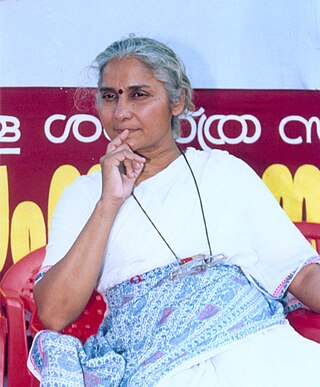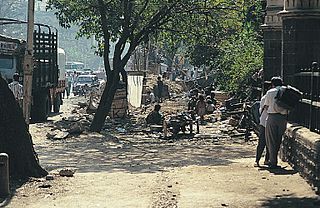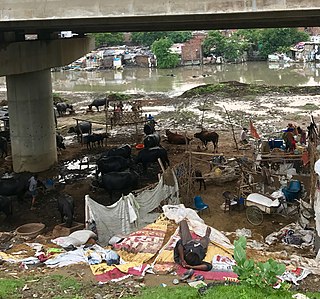
Narmada Bachao Andolan is an Indian social movement spearheaded by native tribals (adivasis), farmers, environmentalists and human rights activists against a number of large dam projects across the Narmada River, which flows through the states of Gujarat, Madhya Pradesh and Maharashtra. Sardar Sarovar Dam in Gujarat is one of the biggest dams on the river and was one of the first focal points of the movement. It is part of the Narmada Dam Project, whose main aim is to provide irrigation and electricity to people of the above states.

Medha Patkar is a politician and activist working on certain political and social issues raised by tribals, dalits, farmers, labourers and women facing injustice in India. She is an alumnus of TISS, a premier institute of social science research in India..

Yeshwant Vishnu Chandrachud was an Indian jurist who served as the 16th Chief Justice of India, serving from 22 February 1978 to the day he retired on 11 July 1985. Born in Pune in the Bombay Presidency, he was first appointed a Justice of the Supreme Court of India on 28 August 1972 and is the longest-serving Chief Justice in India's history at 7 years and 4 months. His nickname was Iron Hands after his well-regarded unwillingness to let anything slip past him.
Ruth Manorama is a Dalit social activist from Bangalore, India who fights for Dalit women's rights, the rights of domestic workers and those in the unorganized labour sector, as well as urban slum dwellers. In 2006, she was awarded the Right Livelihood Award.
Mahila Milan is a self-organised, decentralised collective of female pavement dwellers in Bombay. The group works with issues such as housing, sanitation, and grassroots lending schemes. It aims at gaining women equal recognition for improvement of their communities, while indulging in important decision making activities. The loans granted by the group to its members in times of need, are sanctioned in the name of the woman of the house.

Pavement dwellers refers to informal housing built on the footpaths/pavements of city streets. The structures use the walls or fences which separate properties from the pavement and street outside. Materials include cloth, corrugated iron, cardboard, wood, plastic, and sometimes also bricks or cement.
The Slum Rehabilitation Act 1995 was passed by the government of the Indian state Maharashtra to protect the rights of swamp dwellers and promote the development of swamp areas. The Act protected from eviction, anyone who could produce a document proving they lived in the city of Mumbai before January 1995, regardless if they lived on the swamp or other kinds of marsh land. The ACT was the result of policy development that included grassroots slum dweller organisations, particularly SPARC.
We, the Invisible was a report based on a 1985 census of around 6,000 pavement dweller families, funded and carried out by the Society for the Promotion of Area Resource Centers (SPARC) and the Society for Participatory Research in India (PRIA). It drew attention to this disadvantaged group and helped to reduce the number of violent evictions.
Mahul, Chembur East, Mumbai - 400074 Mahul is a fishing village in Chembur, Mumbai, located on the eastern seafront of the Mumbai Suburban district. Since 2017, Mahul has been in the news for its high levels of pollution and the dismal conditions of its 72-building slum resettlement colony. The area has come to be referred to as Mumbai's "toxic hellhole", "gas chamber", and "human dumping ground", where the poor "are sent to die".

The Scheduled Tribes and Other Traditional Forest Dwellers Act, 2006, is a key piece of forest legislation passed in India on 18 December 2006. It has also been called the Forest Rights Act, the Tribal Rights Act, the Tribal Bill, and the Tribal Land Act. The law concerns the rights of forest-dwelling communities to land and other resources, denied to them over decades as a result of the continuance of colonial forest laws in India.

The Human Rights Law Network (HRLN) is an Indian non-profit organisation founded in 1989 to protect the fundamental human rights and civil liberties of the most marginalised and vulnerable members of society. Working on the intersection of law, advocacy, policy, and education, HRLN is organised as a collective of lawyers and social activists dedicated to providing legal assistance to vulnerable and disadvantaged individuals, advocating for the implementation of structures to safeguard human rights and fight systemic oppression, and educating the public on their rights and remedies. HRLN provides pro bono legal services to marginalised groups, conducts investigations into human rights violations, and undertakes high-stakes impact litigation in service of the public interest. The organisation operates across the spectrum of public interest law, focusing specifically on children’s rights, rights of disabled persons, rights of people living with HIV/AIDS, prisoners' rights, refugee rights, rights of indigenous people, workers' rights, rights of minorities, and the protection of victims of sexual violence or trafficking.

Homelessness is a major issue in India. The Universal Declaration of Human Rights defines 'homeless' as those who do not live in a regular residence. The United Nations Economic and Social Council Statement has a broader definition for homelessness; it defines homelessness as follows: ‘When we are talking about housing, we are not just talking about four walls and a roof. The right to adequate housing is about security of tenure, affordability, access to services and cultural adequacy. It is about protection from forced eviction and displacement, fighting homelessness, poverty and exclusion. India defines 'homeless' as those who do not live in Census houses, but rather stay on pavements, roadsides, railway platforms, staircases, temples, streets, in pipes, or other open spaces. There are 1.77 million homeless people in India, or 0.15% of the country's total population, according to the 2011 census consisting of single men, women, mothers, the elderly, and the disabled. However, it is argued that the numbers are far greater than accounted by the point in time method. For example, while the Census of 2011 counted 46,724 homeless individuals in Delhi, the Indo-Global Social Service Society counted them to be 88,410, and another organization called the Delhi Development Authority counted them to be 150,000. Furthermore, there is a high proportion of mentally ill and street children in the homeless population. There are 18 million street children in India, the largest number of any country in the world, with 11 million being urban. Finally, more than three million men and women are homeless in India's capital city of New Delhi; the same population in Canada would make up approximately 30 electoral districts. A family of four members has an average of five homeless generations in India.

The Indian People's Tribunal (IPT), also called the Indian People's Tribunal on Environmental and Human Rights or Independent People's Tribunal, was a People's Tribunal set up by the Human Rights Law Network (HRLN) on 5 June 1993. The IPT is an unofficial body led by retired judges who form a panel that conducts public enquiries into human rights and environmental abuses. It provides an alternative outlet for the victims faced with official obstruction and delays. Since being founded the IPT has conducted numerous investigations into cases of relocation of rural people to make way for dams or parks, eviction of slum dwellers, industrial pollution and communal or state-sponsored violence.
Hosbet Suresh was a judge of the Bombay High Court who led a number of commissions that investigated violations of human rights.

The Katkari also called Kathodi, are an Indian tribe from Maharashtra. They have been categorised as a Scheduled tribe. They are bilingual, speaking the Katkari language, a dialect of the Marathi-Konkani languages, with each other; they speak Marathi with the Marathi speakers, who are a majority in the populace where they live. In Maharashtra the Katkari have been designated a Particularly vulnerable tribal group (PVTG), along with two other groups included in this sub-category: the Madia Gond and the Kolam. In the case of the Katkari this vulnerability derives from their history as a nomadic, forest-dwelling people listed by the British Raj under the Criminal Tribes Act of 1871, a stigma that continues to this day.
Recognized by The Guardian (UK) as one of the "World's Top 100 Inspiring Women," Jayshree Satpute is a human rights lawyer and co-founder of Nazdeek. Satpute is a legal advocate in human rights pursuing cases in the Supreme Court and High Courts of India related to injustices to slum dwellers, refugees, women labourers, care of orphaned children, juveniles, Right to Information (RTI), and related issue areas.
Justice K. S. Puttaswamy is an Indian retired judge of the Karnataka High Court who was also the original petitioner, challenging the Government of India over making Aadhaar mandatory. He had filed a writ petition in 2012 and over the last five years, 26 other petitions have been tagged along with his, challenging the scheme.
Ghar Bachao Ghar Banao Aandolan is a people's movement that emerged in the backdrop of massive slum demolitions in Mumbai in 2003–04. It started in 2005 as a struggle for housing rights in Mumbai, and continues to fight for rights of slum-dwellers and those cheated by the builders in various rehabilitation and redevelopment projects, including slum-dwellers, those affected by the Slum Rehabilitation Act and the unorganised sector workers. It is a part of the National Alliance of People's Movements and is led by Medha Patkar.
S. Muralidhar is an Indian Judge. He is former Chief Justice of Orissa High Court and Judge of the Punjab and Haryana High Court and Delhi High Court.
Slum clearance in India is used as an urban renewal approach to redevelop and transform poor and low income settlements into new developments or housing. Millions of people live in slum dwellings across India and many migrate to live in the slums from rural villages, often in search of work opportunities. Houses are typically built by the slum dwellers themselves and violence has been known to occur when developers attempt to clear the land of slum dwellings.









